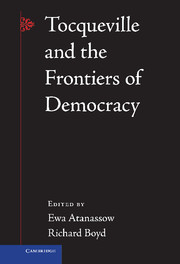Book contents
- Frontmatter
- Contents
- List of Contributors
- Short Title Abbreviations of Tocqueville's Major Works
- Acknowledgments
- Introduction: Tocqueville and the Frontiers of Democracy
- Part One The Meaning of Democracy and the Democratic Revolution
- 1 Democracy and Revolution in Tocqueville: The Frontiers of Democracy
- 2 The Frontier Between Aristocracy and Democracy
- 3 Tocqueville's Burke, or Story as History
- Part Two Democratization in a Non-Western Context
- Part Three Challenges of Globalization: Democracy, Markets, and Nationhood
- Part Four Democracy, Imperialism, and Foreign Policy
- Part Five Democracy's Old and New Frontiers
- Epilogue: New Frontiers, Old Dilemmas
- Bibliography of Works Cited
- Index
- References
3 - Tocqueville's Burke, or Story as History
Published online by Cambridge University Press: 05 April 2013
- Frontmatter
- Contents
- List of Contributors
- Short Title Abbreviations of Tocqueville's Major Works
- Acknowledgments
- Introduction: Tocqueville and the Frontiers of Democracy
- Part One The Meaning of Democracy and the Democratic Revolution
- 1 Democracy and Revolution in Tocqueville: The Frontiers of Democracy
- 2 The Frontier Between Aristocracy and Democracy
- 3 Tocqueville's Burke, or Story as History
- Part Two Democratization in a Non-Western Context
- Part Three Challenges of Globalization: Democracy, Markets, and Nationhood
- Part Four Democracy, Imperialism, and Foreign Policy
- Part Five Democracy's Old and New Frontiers
- Epilogue: New Frontiers, Old Dilemmas
- Bibliography of Works Cited
- Index
- References
Summary
The brooding presence of Edmund Burke can hardly be overlooked in the first volume of Alexis de Tocqueville's Ancien Régime and the Revolution. His opinions, judgments, and very words serve as bookends to the first part of that work and to the volume as a whole. It is clear that Tocqueville found great value in a witness who was, so to speak, present at the creation. And such a witness he was! A man of long experience, with powers of close observation, and distant enough from the scenes of action not to be entangled in the factional maneuverings that beset the French both before and during the dismantling of their state. Tocqueville would expect Burke's understanding of contemporary events to be as discerning as one might hope for – comparable in value, albeit for different reasons, to the firsthand observations of Arthur Young. It is no less clear, however, that Burke served Tocqueville as an exemplary case of contemporary ignorance and bewilderment about the Revolution.
Burke, whose loathing for the Revolution radiated through his mind from its birth, even he for a few moments was uncertain when it happened. His first prophecy was that France would be weakened and virtually destroyed by it. “We may assume,” he said, “that France's military capacity has for a long time been removed, maybe forever, and that men of the following generation will be able to echo the words of this ancient writer: Gallos quoque in bellis floruisse audivimus. (We have heard that the Gauls, too, once excelled in war).”
Judgments of an historical event from close to are no better than those coming well after it.
- Type
- Chapter
- Information
- Tocqueville and the Frontiers of Democracy , pp. 74 - 86Publisher: Cambridge University PressPrint publication year: 2013
References
- 3
- Cited by

